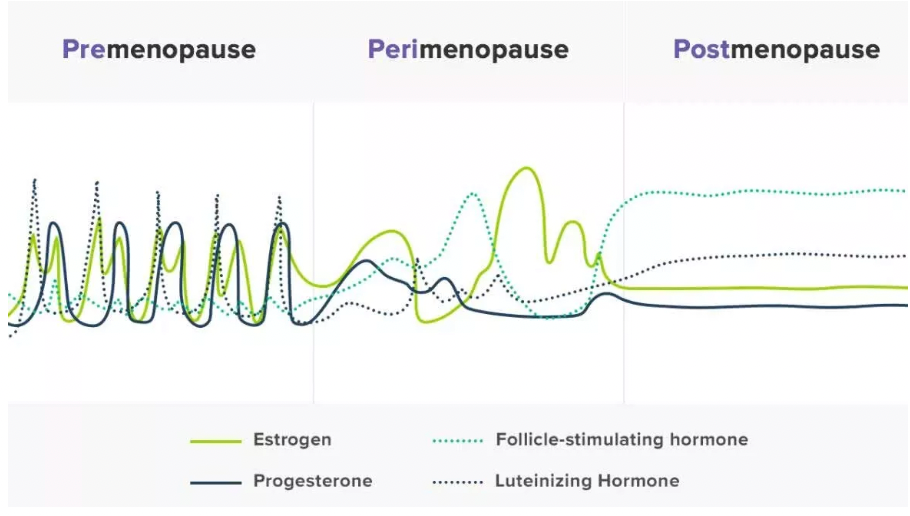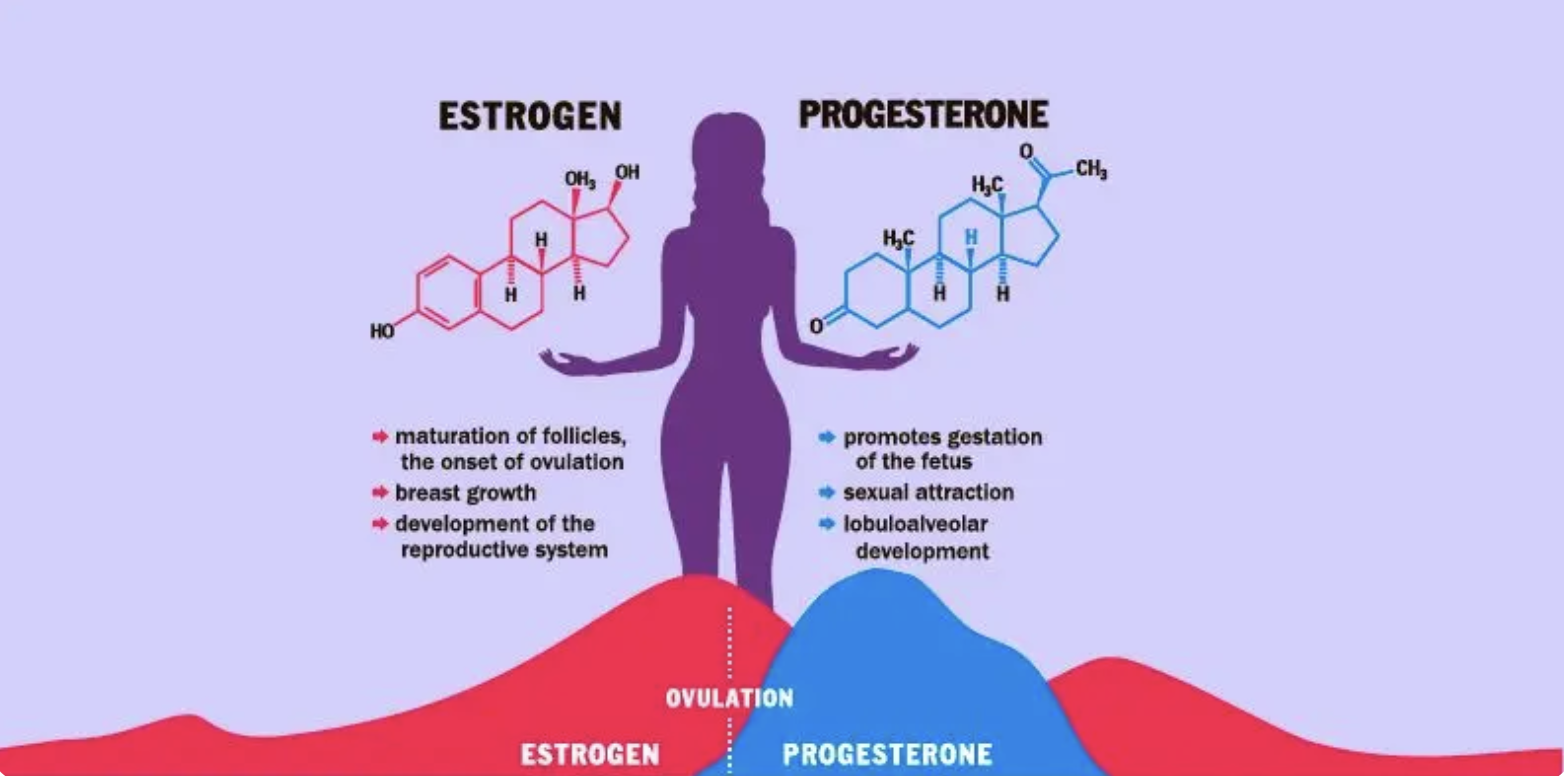Estrogen

Where do all the symptoms come from?! Why the hot flashes, the brain fog, the rage and panic? Why the tinnitus, the dehydration, and joint pain? Why, as we travel through the menopause transition into postmenopause, are we at increased risk of cardiovascular disease, high cholesterol, diabetes, osteoporosis, and dementia?
Simply, we have estrogen receptors in almost every single cell of our bodies.
Pause and take that in for a moment.
We have estrogen receptors in almost every single cell of our bodies.
As a result, when estrogen production becomes erratic and ultimately declines, cells in every organ and system in our bodies are profoundly affected, starved of a hormone they have been accustomed to receiving and using for the smooth functioning of our bodies for decades.
· We have probably noticed with chagrin that declining estrogen affects the softness and plumpness of our skin, but the effects of lower estrogen on collagen can also impact how and how quickly we heal from even minor injuries. We may have noticed that our flexibility seems to have declined, and joints and muscles are achier and less amenable to our usual workouts and stretching routines.
· Estrogen not only affects collagen, but also elastin, which is important not only for ligaments and muscle tissue, but critical for the elasticity of our blood vessels, arteries, and vaginal walls. As elasticity is lost, our bodies become achier and more prone to injury, vaginal penetration may become painful or uncomfortable, and our blood vessels and arteries have more difficulty dilating and constricting easily or regularly. This can lead to temperature regulation issues as well as increased risks associated with cardiovascular disease.
· We have estrogen receptors in our ears! This is one of the first things I learned about estrogen and menopause because tinnitus was the harbinger of menopause for me. I got out of bed one night when I couldn’t fall asleep because of the ringing in my ears that seemed to have suddenly appeared. For some reason I thought to myself, “I bet this is menopause.” I spent the night googling and found that, although it is not currently listed on official medical menopause symptom lists, tinnitus and hearing issues in general are reported by some women going through this transition.
· Estrogen is critical to bone formation, which is why we are vulnerable to osteopenia (lower bone density) and osteoporosis (brittle, fragile bones) as we age. The bladder, vulva, and vagina all become vulnerable to increased risk of infection and injury because estrogen decline results in decreased blood flow and increased fragility of the tissues in these areas. Our microbiome—both in the colon and in the vagina—changes as well.
· Hot flashes and cold spells originate from confusion in the hypothalamus, which is the part of the brain that regulates temperature. It is full of estrogen receptors. As the amount of estrogen spikes and plummets through perimenopause and beyond, the hypothalamus gets erratic signals about how the body is feeling temperature-wise. So it heats us up, sometimes past endurance, or it freezes us from the inside—all regardless of the season, the warmth of the room we’re in, what we’re wearing, or whatever activity we’re doing.
o Why do so many of these seem to happen at night? The prevailing wisdom is that as body temperature naturally drops during the night, the confused hypothalamus overreacts to that drop in temp and sends a rush of warmth into the body. This seriously fucks with sleep and can also trigger night sweats so that we wake up soaked in wet sheets and shivering.
· In perimenopause many women find long-forgotten or buried memories surfacing and clamoring for attention. The hippocampus, the memory center of our brains, is also affected by fluctuating and declining estrogen levels, because it, too, is full of estrogen receptors. The positive point of view is that menopause naturally gives us a built-in opportunity to deal with past wounds, unresolved “stuff,” and recalcitrant habits and patterns that have kept us stuck in ways that hold us back.
o While it’s happening, it can feel overwhelming and burdensome, triggering grief, rage, frustration, and fear. It can make us feel crazy and stressed out to try to cope with events and issues we thought were in the past while the present feels so out of control.
o Estrogen’s effects on the hippocampus are also what cause short-term memory loss, forgetfulness, and brain fog in menopause. These symptoms often undermine women’s confidence and self-esteem, especially in their work, and provoke fear that they are beginning to experience dementia or Alzheimer’s.
· It is not only certain structures in the brain that are affected by the loss of estrogen. The entire brain is filled with estrogen receptors and so the entire brain is impacted by the profound inner changes precipitated by the menopause transition. Moods, thoughts, digestion, immune functioning, sexual function, the flow of our blood, the well-being of our muscles, joints, glands, bones, senses, all of our organs—not just uterus and ovaries—are all profoundly influenced by the oscillation and decline of estrogen in menopause.
· And of course, the increasing irregularity of our menstrual cycles in terms of timing, blood flow, and presence of symptoms are all responsive to the variable estrogen and progesterone levels of menopause. Heavier and lighter flows, the increasing and decreasing frequency of periods, changes in cramping, breast tenderness, nausea, etc. are all part of the shifting hormonal landscape within us.
We tend to think of the hormones estrogen, testosterone, and progesterone as sex hormones. We learn and read about them almost solely with regard to menstruation, reproduction, and sexual functioning, both budding and waning.

However, the idea that these extraordinarily critical chemical messengers are only important for the functioning of our sexual and reproductive capacities minimizes our understanding and appreciation of them in ways that can undermine our health and well-being in serious ways.
The word hormone is derived from the Greek and denotes “that which sets in motion.” Hormones are the chemical messengers that are constantly moving throughout our bodies giving cues to organs about what they need to be doing more or less of at any given time. They profoundly impact our sleep, digestion, and immune system; our response to stress; our ability to conceive, give birth, and breastfeed; the ways that we connect and bond with others; our brains, moods, and the tenor of our thoughts. Hormones work in networks of communication with each other and with every other part of the body in an attempt to keep the organism of us capable of responding to what arises in each moment—emergencies, sexual arousal, the need for sleep, the ability to focus on a project or to respond to a crying child—and to return us to homeostasis efficiently.
Estrogen was found by scientists in 1934. The term estrogen is from the Greek, oistros, “which means frenzy or mad desire—further reinforcing a historical trend to frame female physiology through the lens of mental instability” (Mosconi, p.18). When the link between estrogen and menopause was found, the medical field shifted its view of menopause from being a condition of mental illness or insanity to being “a disease of estrogen deficiency” (Mosconi, p.18).
Menopause is not a disease any more than puberty or pregnancy is. Yet it is important to acknowledge that the extraordinary life possibilities and experiences of women—menstruation, pregnancy—have been routinely pathologized throughout history in patriarchal cultures. It should be no surprise that menopause has been stigmatized as well, even more so because it has marked the end of a woman’s reproductive life and the incorrectly perceived end of her productive life.
It is both more constructive and truer to understand menopause as a radical change in one’s state of being rather than as a “disease” of any kind. Dr. Lisa Mosconi, in her book The Menopause Brain, suggests that during the menopause transition the brain is undergoing a rewiring process, much as it does during puberty or pregnancy. This “rewiring” is preparing us for a new phase of life, helping us to prune and release what no longer serves us, homing in on a fresh set of priorities, and strengthening us in perhaps unfamiliar ways—expression, boundary setting, building muscle and bone—to accomplish what we now envision for ourselves.

Resources:
The Menopause Manifesto by Dr. Jen Gunter
The Menopause Brain by Dr. Lisa Mosconi